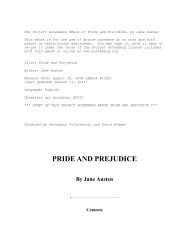pride
Create successful ePaper yourself
Turn your PDF publications into a flip-book with our unique Google optimized e-Paper software.
and a billiard-table, but gentlemen cannot always be within doors; and in the nearness of the<br />
Parsonage, or the pleasantness of the walk to it, or of the people who lived in it, the two<br />
cousins found a temptation from this period of walking thither almost every day. They<br />
called at various times of the morning, sometimes separately, sometimes together, and now<br />
and then accompanied by their aunt. It was plain to them all that Colonel Fitzwilliam came<br />
because he had pleasure in their society, a persuasion which of course recommended him<br />
still more; and Elizabeth was reminded by her own satisfaction in being with him, as well as<br />
by his evident admiration of her, of her former favourite George Wickham; and though, in<br />
comparing them, she saw there was less captivating softness in Colonel Fitzwilliam's<br />
manners, she believed he might have the best informed mind.<br />
But why Mr. Darcy came so often to the Parsonage, it was more difficult to understand. It<br />
could not be for society, as he frequently sat there ten minutes together without opening his<br />
lips; and when he did speak, it seemed the effect of necessity rather than of choice—a<br />
sacrifice to propriety, not a pleasure to himself. He seldom appeared really animated. Mrs.<br />
Collins knew not what to make of him. Colonel Fitzwilliam's occasionally laughing at his<br />
stupidity, proved that he was generally different, which her own knowledge of him could<br />
not have told her; and as she would liked to have believed this change the effect of love, and<br />
the object of that love her friend Eliza, she set herself seriously to work to find it out. She<br />
watched him whenever they were at Rosings, and whenever he came to Hunsford; but<br />
without much success. He certainly looked at her friend a great deal, but the expression of<br />
that look was disputable. It was an earnest, steadfast gaze, but she often doubted whether<br />
there were much admiration in it, and sometimes it seemed nothing but absence of mind.<br />
She had once or twice suggested to Elizabeth the possibility of his being partial to her,<br />
but Elizabeth always laughed at the idea; and Mrs. Collins did not think it right to press the<br />
subject, from the danger of raising expectations which might only end in disappointment;<br />
for in her opinion it admitted not of a doubt, that all her friend's dislike would vanish, if she<br />
could suppose him to be in her power.<br />
In her kind schemes for Elizabeth, she sometimes planned her marrying Colonel<br />
Fitzwilliam. He was beyond comparison the most pleasant man; he certainly admired her,<br />
and his situation in life was most eligible; but, to counterbalance these advantages, Mr.<br />
Darcy had considerable patronage in the church, and his cousin could have none at all.<br />
Chapter 33<br />
More than once did Elizabeth, in her ramble within the park, unexpectedly meet Mr.<br />
Darcy. She felt all the perverseness of the mischance that should bring him where no one<br />
else was brought, and, to prevent its ever happening again, took care to inform him at first<br />
that it was a favourite haunt of hers. How it could occur a second time, therefore, was very<br />
odd! Yet it did, and even a third. It seemed like wilful ill-nature, or a voluntary penance, for<br />
on these occasions it was not merely a few formal inquiries and an awkward pause and then



